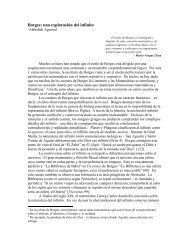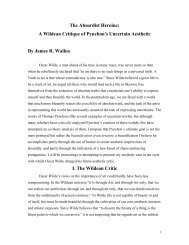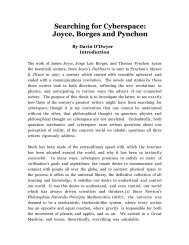And A Very Good Time It Was: A Short Life of ... - The Modern Word
And A Very Good Time It Was: A Short Life of ... - The Modern Word
And A Very Good Time It Was: A Short Life of ... - The Modern Word
You also want an ePaper? Increase the reach of your titles
YUMPU automatically turns print PDFs into web optimized ePapers that Google loves.
With his usual grand gestures, Joyce told his brother Stanislaus that, if he didn’t survive the<br />
trip, to send copies <strong>of</strong> his poems and epiphanies to all the great libraries <strong>of</strong> the world, including<br />
the Vatican. 43 With this first departure in early December, 1902, and with all future ones, Joyce<br />
imagined himself the subject <strong>of</strong> others’ scorn and consequently relished his status as a martyred<br />
exile.<br />
Once in Paris he read, wrote, and in a train station made the discovery <strong>of</strong> Emile Dujardin’s<br />
Les lauriers son coupées, perhaps Joyce’s first literary source for the interior monologue. 44 He<br />
also sent letters home giving the strictest detail <strong>of</strong> his poverty and illness. Only twenty days after<br />
his arrival he wrote to Lady Gregory, “My prospects for studying medicine here are not<br />
inviting.” 45 As he would so <strong>of</strong>ten in the future, he settled on giving English lessons, and wrote to<br />
his parents about coming home for Christmas. His father promptly put another mortgage on the<br />
house to pay for the trip.<br />
While in Dublin again in early 1903 he met Oliver St. John Gogarty (Buck Mulligan in<br />
Ulysses). Four years Joyce’s senior, they both had the same interests (writing, medicine,<br />
blasphemy and obscenity), and like their fictional counterparts, they began to frequent the<br />
National Library and befriend the staff there.<br />
In the middle <strong>of</strong> January Joyce returned to Paris, though one wonders why. Aside from<br />
reading Aristotle and Aquinas and becoming more clear on his aesthetic theory, he seems capable<br />
only <strong>of</strong> pitiful letters home with remarks like, “Monday and Tuesday are carnival days and I shall<br />
probably be the only one starving in Paris.” 46 He did meet the playwright John Millington Synge<br />
there, but complained that his Riders to the Sea was too short. Foretelling his own ambitions, he<br />
said, “No one-act play, no dwarf-drama can be a knockdown argument.” 47<br />
By then Joyce’s mother had been sick for some time, and on <strong>Good</strong> Friday Joyce received a<br />
telegraph from his father: “MOTHER DYING COME HOME FATHER.” Penniless, Joyce was<br />
able to borrow the money he needed from one <strong>of</strong> his English students. 48 <strong>And</strong> in one <strong>of</strong> my favorite<br />
details <strong>of</strong> Joyce’s life, “He crossed from Dieppe to Newhaven and spoke broken English on the<br />
pier to avoid tipping a porter to carry his bag.” 49<br />
Told in horrifically memorable detail in the opening episode <strong>of</strong> Ulysses, Joyce’s mother<br />
begged him (and his brother Stanislaus) to receive Communion and Confession. Both refused.<br />
What might seem an unforgivable cruelty to one’s mother is justified by Joyce as his fear <strong>of</strong> false<br />
homage “to a symbol behind which are massed twenty centuries <strong>of</strong> authority and veneration.” 50<br />
Meanwhile his father took out another mortgage on the house to pay for medical expenses.<br />
His mother did not die until August <strong>of</strong> that year, and between April and then Joyce wandered<br />
Dublin. <strong>It</strong>’s been written that Gogarty was the first to truly encourage Joyce to drink, but Costello<br />
suggests it was the death <strong>of</strong> Joyce’s little brother George, two years earlier, that did that. 51 <strong>It</strong>’s<br />
clear anyway that Gogarty at least encouraged Joyce to drink more <strong>of</strong>ten, and this enraged<br />
Stanislaus, who was already jealous <strong>of</strong> the attention Joyce’s friends were given, and sick <strong>of</strong> their<br />
designation <strong>of</strong> him as “James’s ape.” 52<br />
During the three months following his mother’s death, Joyce wrote thirteen reviews for <strong>The</strong><br />
Daily Express. Nearly all <strong>of</strong> them negative, and after a disagreement with the editor, he was told<br />
not to submit anymore. He was turned down for almost every job he applied for, and refused<br />
every job he was <strong>of</strong>fered, and took some classes in law and medicine. He was even sub-editor <strong>of</strong><br />
the Irish Bee-Keeper, but it was a position that lasted “for about twenty-four hours.” 53 His only<br />
steady job appears to have been a year later, between March and June, 1904, when he was a<br />
schoolteacher in Dalkey, an experience later transferred to the Nestor episode <strong>of</strong> Ulysses.<br />
1904 was the year his life truly changed. First, in January, when told <strong>of</strong> a new journal looking<br />
for submissions, Joyce quickly wrote and sent <strong>of</strong>f the autobiographical sketch “A Portrait <strong>of</strong> the<br />
Artist.” <strong>It</strong> was rejected with the words, “I can’t print what I can’t understand,” 54 but as always





